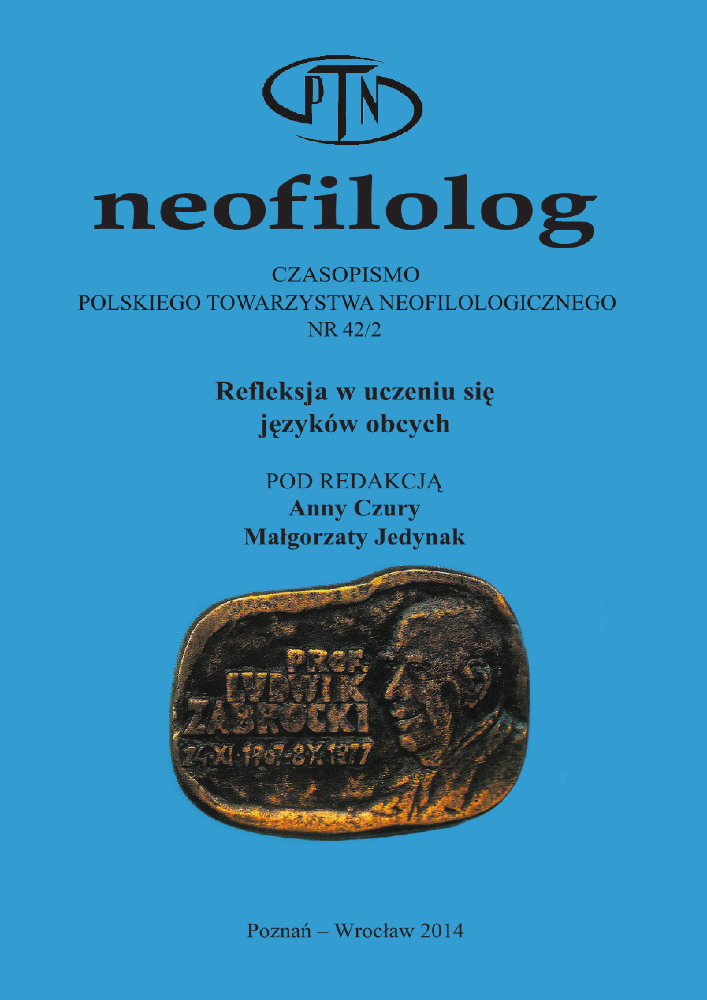Abstrakt
Compared to colleagues teaching foreign languages for general purposes, who can use ready-made syllabuses or programs, the LSP teacher has to reflect on methodology at the level of course planning. The scope and nature of the proposed course content is tailored to the specific needs of a student. The analysis of these needs is based on interviews and questionnaires. There are many examples of such tools, but none of them are universal or exhaustive, nor can they be. The purpose of this article is to propose a set of parameters to facilitate investigation of the educational context, which could be a starting point for the development of questionnaires tailored to specific education needs.Bibliografia
Carras, C., Tolas, J., Kohler, P., Szilagyi, E. 2007. Le Français sur objectifs spécifiques et la classe de langue. Paris: CLE International.
Delhaye, P. 2006. „De l’analyse de besoins à l’évaluation: le Diplôme de Compétence en Langue”. Synergies Pays riverains de la Baltique 3: 127-140.
Gajewska, E., Sowa, M. 2014. LSP, FOS, Fachsprache… Glottodydaktyka języków specjalistycznych. Lublin: Werset.
Eurin Balmet, S., Henao de Legge, M. 1992. Pratiques du français scientifique. Paris: Hachette.
Lehmann, D. 1993. Objectifs spécifiques en langue étrangère. Les programmes en cours. Paris: Hachette.
Mangiante, J.-M. 2007. „Une démarche de référentialisation en français des professions: le partenariat université – Chambre de Commerce et d’Industrie de Paris (CCIP)”. Le Français dans le monde. Recherches et applications 42: 129-144.
Mangiante, J.-M., Parpette, Ch. 2004. Le français sur Objectif Spécifique: de l’analyse des besoins à l’élaboration d’un cours. Paris: Hachette.
Velásquez-Bellot, A. 2004. „Metodología teórica del proceso de elaboración de un diseño curricular para la enseñanza de las lenguas con fines específicos”. Revista Electrónica de Didáctica del Español como Lengua Extranjera. http:// www.educacion.gob.es/dctm/redele/Material-RedEle/Revista/200402/2004r edELE216Velazquez.pdf?documentId=0901e72b80e06a67 DW 21.10.2013.
Licencja
Prawa autorskie (c) 2019 Elżbieta Gajewska, Magdalena Sowa

Utwór dostępny jest na licencji Creative Commons Uznanie autorstwa – Bez utworów zależnych 4.0 Międzynarodowe.
Przedstawiany utwór (artykuł) upubliczniany jest na podstawie umowy z autorem i na licencji Creative Commons Attribution-NoDerivatives 4.0 International (CC BY-ND 4.0).
Użytkownicy mają obowiązek podania wraz z rozpowszechnionym utworem, informacji o autorstwie, tytule, źródle (odnośniki do oryginalnego utworu, DOI) oraz samej licencji;
- bez tworzenia utworów zależnych,
- utwór musi być zachowany w oryginalnej postaci.
Uniwersytet im. Adama Mickiewicza w Poznaniu zachowuje prawo do czasopisma jako całości (układ, forma graficzna, tytuł, projekt okładki, logo itp.).
